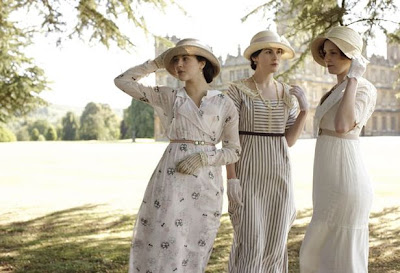
Last Sunday, Downton Abbey's season two finished in the US as well and so we're all - sadly - facing at least a year without our favorite Upstairses and Downstairses. Even though Mad Men is returning next month, I for one will certainly miss them - as many reviews have pointed out throughout the second season, Downton is basically a soap series with pretty costumes, but it's a soap series I enjoy, even with all its amnesia cases, dead fiancees, sudden fits of paralysis and wartime telepathy. As I stated in an earlier post, it gets plenty of things wrong, but I also think it gets a lot of things just right.
The Crawley sisters are a good example of that. I think these three women, who are fundamentally different in many ways, illustrate three fundamentally different takes on the modernity that is pretty much thrust upon them during the second decade of the new century. I think the way the modern viewer views these three is influenced by those differences, although I personally have plenty of sympathy for each of them.
Mary, as the eldest, is the 19th century girl of the three; although she may occasionally struggle against the societal mores that regulate her life, she is essentially a supporter of the system she grew up in. To say that she wants to be her mother would be wrong, because her mother herself, as an American heiress, is a surprisingly "modern" presence within the British aristocracy. Mary wants to be her grandmother; she wants to be presented at court, she wants to be received in society, and though she values love and affection, she wants to marry someone who is not just her husband, but also preferably an aristocrat with an inheritance to look forward to. She's smart and she has a strong character, but escaping her world isn't an ambition of hers; when Mr Pamuk actually responds to her flirtations, she acts surprisingly like a frightened child. She doesn't want to be a scandal. She just wants to be who she was born to be. And that would be perfectly fine had she been born fifty years earlier, but this is the 1910s and who she was born to be might not be a person who will fit into this postwar world.
Although her and Edith have this prolonged sisterly rivalry going on, it is Sybil rather than Edith who is Mary's polar opposite. We love Mary because she's beautiful and Edwardian and dignified and a vision from an age gone by; we love Sybil because she is the classic "wayward girl with a heart of gold" character. She is the closest to a modern female as we're getting on this show, and as such, we recognize her as one of us and want her to do well. Sybil's transgression isn't a one-night-stand with a Turkish diplomat (because, had Pamuk lived, I firmly believe that's all his night with Mary would have ended up being), but a real, honest relationship with one of the servants - a relationship she takes her sweet time contemplating, because she knows what she's risking and she gradually begins to realize that what she's risking isn't anything she wanted in the first place, anyway. Sybil, with her unusually great sense of social justice, with her wild ideas of women's rights, is perhaps something of an anachronism, but also a pretty interesting depiction of the kind of woman World War One would produce. The War gave her the opportunity to be truly useful without any social repercussions, and afterward, she finds herself unwilling to go back to the mold she formerly fit into. Mary, of course, RUNS, does not walk, back to that mold as soon as she can.
Edith is an interesting character because she's such an in-betweener in more ways than one. The middle child and perhaps the least conventionally attractive of the three, she spent the entire first season in a crazy feud with Mary. I think that has led a lot of readers to view her as a part of that 19th century world alongside her older sister, with Sybil as the lone "modern" soul jumping headfirst into the new century, but I think that's a little overly simplistic, as the second season has shown. We'll never see Edith wearing crazy harem pants, and - in spite of her brief tryst with that farmer - we'll also, most likely, never catch her marrying someone as dramatically below her on the social ladder as Branson is to Sybil. But she also isn't Mary, the perfect heiress to whom the Great War is an unpleasant disruption of home life. Edith really comes into herself during the wartime years, and afterward, as the last officers leave, her and Sybil bond on-screen for the first time when it's obvious that neither of them wants to return to the status quo of 1914.
Maybe that's why I like Edith best. It is, I believe, pretty clear by this point which way Mary and Sybil's lives are headed, but I think Edith could still go either way, and that's definitely something to remember as we await season three.
No comments:
Post a Comment